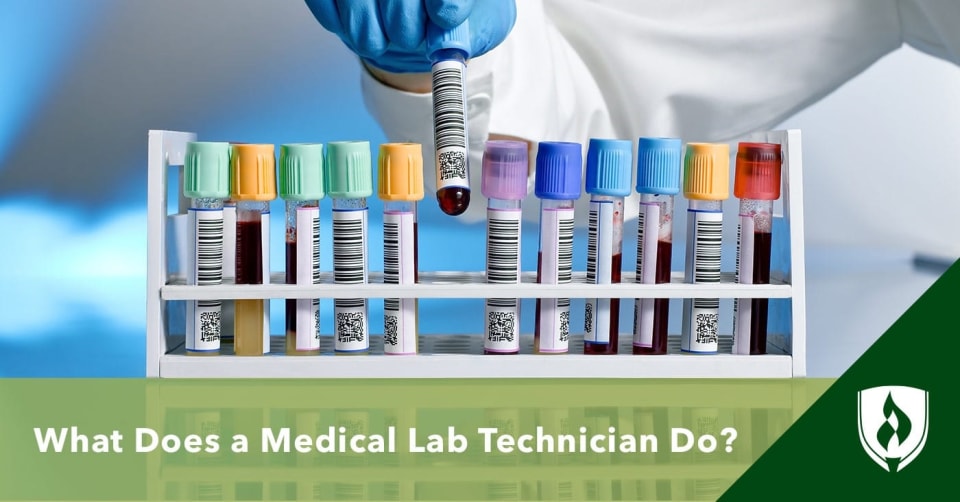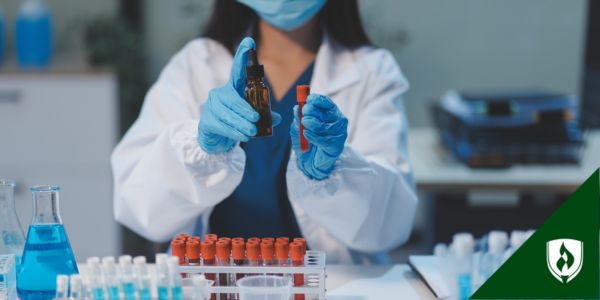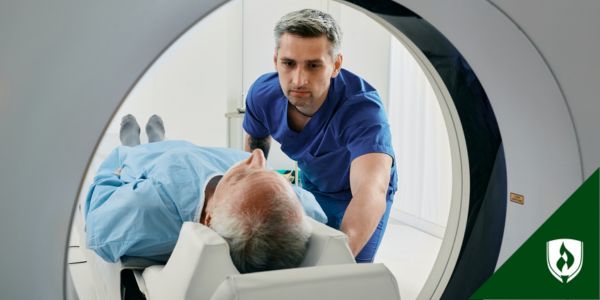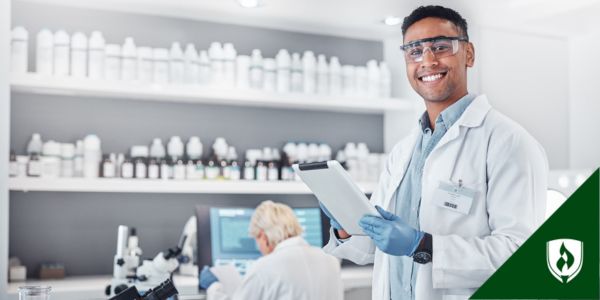
You’ve heard about the exciting growth in the healthcare industry, but you don’t exactly picture yourself as a doctor or nurse. It’s important to know that not all healthcare careers involve direct patient care. There are in-demand opportunities in the field that allow you to work behind-the-scenes while still having a positive impact on people’s health
Becoming a medical laboratory technician (MLT) is one of those opportunities. The bright future of this field is indicated by the estimated 11 percent increase in employment for medical lab technicians through 2028, according to the Bureau of Labor Statistics (BLS).1 That’s more than two times the projected average for all occupations.
That stat alone should pique your interest about this career. But it’s not enough to make up your mind. Before committing to pursue this profession, you need to be able to answer the following question: What does a medical lab technician do?
We’re here to help answer that and other questions you may have about this career so you’ll have a better understanding of if it’s the right one for you.
What role does a medical lab technician play in the healthcare field?
Hospitals and doctors’ offices depend on the important work of medical lab technicians. These professionals are a critical component of a well-functioning healthcare facility. They work under the supervision of physicians, lab managers or lab technologists to conduct lab tests on specimens. The work they do behind-the-scenes helps doctors detect diseases or illnesses and determine treatment options.
Though you may not frequently come into contact with a medical lab tech as a patient, it doesn’t mean they don’t play a crucial role in your medical care. If you do encounter a lab tech, they will likely be donning a full lab coat, mask, gloves and goggles while collecting or handling specimens for testing.
Now let’s get into some more specific job duties.
What does a medical lab technician do exactly?
You know medical lab technicians perform lab tests, but what does that actually mean?
Simply put, these tests are chemical analyses of body fluids–such as blood or urine–using a microscope or other advanced lab equipment. These tools help medical lab technicians detect abnormalities or diseases, which are then recorded and reported in computer systems. These chemical analyses are considered to be a core job duty, but they also use mechanical and electrical devices to ensure their test results conform to specifications.
Medical lab technicians are also tasked with the following:1
- Setting up, maintaining, calibrating, cleaning and testing the sterility of lab equipment
- Preparing solutions or reagents to be combined with samples
- Collecting blood, tissue or other samples from patients
Along with these job duties, MLTs are sometimes responsible for matching blood compatibility for transfusions, analyzing the chemical content of fluids or examining immune system elements. Additionally, they may search for parasites, bacteria and microorganisms in their samples with sophisticated lab equipment.
What are some medical lab technician specialties?
The roles mentioned above will likely vary based on the specific area in which you specialize. For example, medical lab techs focused on phlebotomy will have duties centered on collecting and testing blood.
Other potential medical lab tech specialties include:
- Microbiology
- Blood banking
- Immunology
- Clinical chemistry
- Molecular biology
What are some important medical lab technician skills?
It should be obvious by now that much of a medical laboratory technician’s work revolves around the lab. So it shouldn’t be surprising that many precise technical skills are required. But there are several transferable skills that are just as important to be successful in this role.
We used real-time job analysis software to examine more than 110,000 MLT jobs posted over the past year.2 This data helped us identify the top hard and soft skills employers are seeking in potential lab technicians.
Top technical skills for MLTs2:
- Quality assurance and control
- Chemistry
- Phlebotomy
- Laboratory testing
- Patient care
- Customer service
- Laboratory equipment
- Data entry
- Microbiology
- Occupational health and safety
Top transferable skills for MLTs2:
- Communication
- Organization
- Computer literacy
- Physical ability
- Attention to detail
- Troubleshooting
- Research
- Problem solving
- Teamwork
- Microsoft Office
If you can identify with some of the transferable skills listed above, you may a natural fit for a medical lab tech career. And don’t let the technical skills intimidate you – those are precisely the types of skills taught in a Medical Laboratory Technician program.
How do you become a medical lab technician?
Now that you know more about what medical lab technicians do, you’re probably curious about what you’ll need to land one of these positions. According to the BLS, most medical lab technicians hold an Associate’s degree in clinical laboratory science or a similar subject.1
The good news is that some medical lab tech programs can be completed in as few as 21 months.3 This training will provide a well-rounded knowledge of the field. Here’s a sneak peek of what you can expect.
Common medical lab technician courses:
- Medical terminology
- Clinical Chemistry
- Clinical Microbiology
- Phlebotomy
- Hematology
- Urinalysis
- Immunology
- Immunohematology
In addition to a formal education, some states may also require laboratory personnel to be licensed. To learn the requirements in your state, visit the American Society for Clinical Laboratory Science (ASCLS) website. You may find that your state also requires MLTs to become certified in order to obtain licensure. No matter whether or not your state requires it for licensure, becoming a certified medical lab tech is still a smart option for lab techs, as it shows a dedication to the field and confirmation of what you’ve learned in an academic program.
Can you see yourself as a medical lab technician?
The next time someone asks, “What does a medical lab tech do?” you’ll now be able to answer confidently. MLTs play a critical but often overlooked role in the daily operations of a healthcare facility.
If you’re considering becoming a medical lab technician, learn more about the path ahead in our article, “How to Become a Medical Lab Technician.”
1Bureau of Labor Statistics, U.S. Department of Labor, Occupational Outlook Handbook, [career information accessed March 2020]. www.bls.gov/ooh/. This represents national, averaged data for the occupations listed and includes workers at all levels of education and experience. Employment conditions in your area may vary.
2 Burning-Glass.com (analysis of 112,973 MLT jobs posted, Apr. 01, 2019 – Mar. 31, 2020).
3Time to completion is dependent on accepted transfer credits and courses completed each quarter.
EDITOR’S NOTE: This article was originally published in 2015. It has since been updated to include information relevant to 2020.




